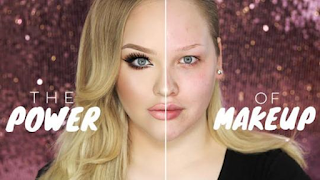Image Credit: Nikkietutorials.(2015). The power of makeup.
"Mark Zuckerberg's ideas about what constitutes
"identity" aren't just laughable — they're downright destructive." (Cox.
2014) High speed internet is the portal to the culturally obsessed cyber-world.
It has become a ‘need’ rather than a ‘want’ to use social networks in the 21st
century. ‘Poke them’ has become a part of society’s youthful vocabulary. Signing
up for Facebook in 2009, it has become a second nature for me to browse through
my news feed each morning as if it were my daily tabloid. I find myself checking my profile more than
3-4 times a day without hesitation. I asked myself why I am so intensely
engrossed in checking my profile. To answer this question I did some research.
I found that each of my profile photos was chosen to make me look my absolute best.
The public can only see the masked makeup disguise I apply. Little does the community
know that underneath my mask of cosmetics is bed hair is a sunburnt face. My
true identity is not being shown to the public. This made me think how many other people are
displaying a masked identity through their Facebook profiles. The power that the person behind these photos hold is incredibly scary. The “Possibility
is always present” that someone is lurking behind a concealed photo of an
invented character. Early in the beginning of entering the computer-generated world, many individuals
thought that every person was going to become a ‘cybernetic
avatar’ (Cox. 2014). Instead all that civilization has ended up with is
downloaded movies, porn and a new power of distinctiveness of what they want themselves
to be perceived as in their online profiles. ‘Is there a ‘true’ self?’ (Ariella
Van Luyn. 2015) Has Zuckerberg done humanity proud creating something as popular
Facebook or has he created a power hungry cyber-world full of forged and phony people?
References:
COX,S. (2014). Facebook has totally reinvented human
identity: Why it’s even worse than you think. Retrieved from http://www.salon.com/2014/10/26/facebook_has_totally_reinvented_human_identity_why_its_even_worse_than_you_think/
Lundberg, A. (2015). BA1002: Our Space: Networks, narratives
and the making of place, Lecture 2: Power. [PowerPoint slides]. Retrieved from https://learnjcu.jcu.edu.au/webapps/blackboard/content/listContent.jsp?course_id=_69740_1&content_id=_1892273_1
Turkle,S. (1995). Life on the screen: Identity in the age of
the internet. New York: Simon and Pchuster Paperbacks
Photograph credit:
Nikkietutorials .(2015). The power of makeup. Retrieved from
http://www.nikkietutorials.com/site/2015/05/the-power-of-makeup/

I agree with you there Claire that we end up checking our profiles on a daily basis without even thinking, it’s the first thing we think about when we wake up. There are even those who have generated a certain reputation and are popular to a certain point on their profiles where it becomes a type of job to update it constantly. They even have fans or stalkers who check their profiles more than they do to see what is happening in their lives. For those people they only provide certain parts of their life that would be found interesting, may girls will put half naked pictures up anything necessary to keep their popularity. This doesn’t allow them to be themselves only what other want to see. It has even come to a point where "Catfishing" has become a huge part of social media (Peterson,2013). Those who “catfish” are constantly hiding their true identity in hope to gain popularity or even just attention of any sort. The internet and social media provide others the resources to fake, forge and influence identities. I believe that through social media it is rare for people to be their true selves.
ReplyDeleteReference
Perterson,H. (2013). Retrieved from http://www.dailymail.co.uk/news/article-2264053/Catfishing-The-phenomenon-Internet-scammers-fabricate-online-identities-entire-social-circles-trick-people-romantic-relationships.html